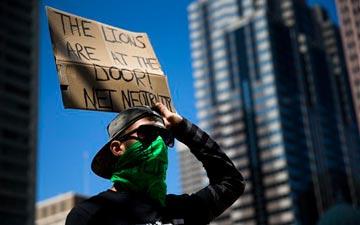
Ann Skeet
Ann Skeet is the director of leadership ethics at the Markkula Center for Applied Ethics. Views are her own.
The FCC is returning to the issue of net neutrality and reaching a different conclusion than the regulatory body did during the Obama administration. We can benefit now from all examples we can find of leaders allowing their minds to be changed and engaging in genuine, open dialogue, which should include attention to the principles of fairness, justice, and the common good. As I indicated in this piece on net neutrality from 2015, my early work experience at C&P Telephone Company convinced me that access to infrastructure should be equal and open for all.
My first job after college nearly 30 years ago was pretty unique for a young woman with an economics degree, and would likely still be considered so today. I secured a position working for C & P Telephone Company, a subsidiary of what is today known as Verizon but was then Bell Atlantic, just a few years after the break-up of Ma Bell. My company served the Washington, D.C. area.
My early days in the Bell System made a huge impression on me and inform my thinking today about the actions people can take in a business environment to wire ethics into the daily business operations of any company. Though my views on many things have changed since I was in my 20s, I hold a constant and clear view from my time at C &P that access to infrastructure should be equal and open for all. The FCC has gotten it right on net neutrality.
The FCC nailed the net neutrality debate in two important ways. First, they have supported an open Internet and in doing so gone against the wishes of my former employer, Verizon. Additionally, Tom Wheeler, in his leadership of the commission, actually allowed his mind to be changed in a public process. The best policy comes from study and dialogue and I believe Mr. Wheeler has modeled that well, rather than feeling he must stick to an earlier position that favored the broadband providers who want to be able to make more money from people seeking access.
My title in my first job all those years ago at C & P was Frame Supervisor. I was responsible for managing a crew of men and women who did the last piece of wiring inside central offices linking the cable pair dedicated to each phone line to the office equipment that gave it a place on the neighborhood switch. When I think about it now, I’m still a bit drop-jaw about the things they let a 21-year-old be responsible for---managing unionized workers with years of experience, leading the project to cutover an entire central office and 75,000 subscribers from an analog switch to a digital one, helping an alcoholic employee through her journey in the company’s Employee Assistance Program.
Three things were drilled into me on my first week on the job at C & P in 1986. First, use of a company phone to make personal, long-distance calls would get me fired. The fee structures were different then. The temptation was big. Managers in the company did a great job impressing upon new hires that it would be a stupid thing do and the boundary and consequences for crossing it were clear.
Second, we understood immediately that we were in a service business. When it snowed in Washington, D.C. and everyone else hunkered down, we were to come to work. Got the sniffles? Too bad. When people picked up their phone they expected dial tone and we were the people who brought it to them. Emergency situation unfolding? Telephones would be even more critical to meet people’s needs and again, we were expected to put the needs of Ma Bell’s customers above our own.
The third point was about those customers of Ma Bell’s. Who were they? Everyone. We new hires learned in our visit to the billing offices, that every Bell Atlantic customer at that time contributed to something known as Universal Service, which subsidized the building of the telephone network and infrastructure in rural areas, and those where a large number of people lived in poverty, for example, to be sure they could be connected to the rest of us, the emergency services they might need, and the information everyone else could get to. Internet access today is no different.
Back then, companies could pay their contribution to Universal Service or pass it along to customers, as C & P did with a line-item surcharge on the bill that most customers most likely did not notice. My old company, Verizon, would have you believe based on the public relations approach they have taken in the past few days that we are being asked by the FCC to return to the laws from the 1930s, but the Telecommunications Act of 1996 upheld this same basic notion.
On the FCC’s website today, they describe what they do this way: “Leadership for consumers, public safety, accessibility, competition and technological and economic opportunity.” It is refreshing to encounter a government entity that is doing what is says it will do and even better to see the practices of dialogue deployed to that end. The FCC has a stewardship function and it is fulfilling it well and they have made the right call. Hey Verizon, can you hear me now?
Apr 27, 2017
--
